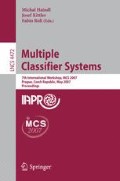Abstract
Cluster ensembles are deemed to be better than single clustering algorithms for discovering complex or noisy structures in data. Various heuristics for constructing such ensembles have been examined in the literature, e.g., random feature selection, weak clusterers, random projections, etc. Typically, one heuristic is picked at a time to construct the ensemble. To increase diversity of the ensemble, several heuristics may be applied together. However, not any combination may be beneficial. Here we apply a standard genetic algorithm (GA) to select from 7 standard heuristics for k-means cluster ensembles. The ensemble size is also encoded in the chromosome. In this way the data is forced to guide the selection of heuristics as well as the ensemble size. Eighteen moderate-size datasets were used: 4 artificial and 14 real. The results resonate with our previous findings in that high diversity is not necessarily a prerequisite for high accuracy of the ensemble. No particular combination of heuristics appeared to be consistently chosen across all datasets, which justifies the existing variety of cluster ensembles. Among the most often selected heuristics were random feature extraction, random feature selection and random number of clusters assigned for each ensemble member. Based on the experiments, we recommend that the current practice of using one or two heuristics for building k-means cluster ensembles should be revised in favour of using 3-5 heuristics.
This work was supported by research grant # 15035 under the European Joint Project scheme, Royal Society, UK.
Access this chapter
Tax calculation will be finalised at checkout
Purchases are for personal use only
Preview
Unable to display preview. Download preview PDF.
References
Ayad, H., Basir, O., Kamel, M.: A probabilistic model using information theoretic measures for cluster ensembles. In: Roli, F., Kittler, J., Windeatt, T. (eds.) MCS 2004. LNCS, vol. 3077, pp. 144–153. Springer, Heidelberg (2004)
Blake, C.L., Merz, C.J.: UCI repository of machine learning databases (1998), http://www.ics.uci.edu/~mlearn/MLRepository.html
Fern, X.Z., Brodley, C.E.: Solving cluster ensemble problems by bipartite graph partitioning. In: Proc. 21th International Conference on Machine Learning, ICML, Banff, Canada (2004)
Fred, A.: Finding consistent clusters in data partitions. In: Kittler, J., Roli, F. (eds.) MCS 2001. LNCS, vol. 2096, pp. 309–318. Springer, Heidelberg (2001)
Fred, A.N.L., Jain, A.K.: Combining multiple clusterungs using evidence accumulation. IEEE Transactions on Pattern Analysis and Machine Intelligence 27(6), 835–850 (2005)
Ghosh, J.: Multiclassifier systems: Back to the future. In: Roli, F., Kittler, J. (eds.) MCS 2002. LNCS, vol. 2364, pp. 1–15. Springer, Heidelberg (2002)
Goldberg, D.: Genetic Algorithms in Search, Optimization and Machine Learning. Addison-Wesley, Reading (1989)
Greene, D., et al.: Ensemble clustering in medical diagnostics. Technical Report TCD-CS-2004-12, Department of Computer Science, Trinity College, Dublin, Ireland (2004)
Kuncheva, L.I., Hadjitodorov, S.T., Todorova, L.P.: Experimental comparison of cluster ensemble methods. In: Proc. FUSION, Florence, Italy (2006)
Minaei, B., Topchy, A., Punch, W.: Ensembles of partitions via data resampling. In: Proceedings of the International Conference on Information Technology: Coding and Computing, ITCC04, Las Vegas (2004)
Monti, S., et al.: Consensus clustering: A resampling based method for class discovery and visualization of gene expression microarray data. Machine Learning 52, 91–118 (2003)
Ripley, B.D.: Pattern Recognition and Neural Networks. University Press, Cambridge (1996)
Strehl, A., Ghosh, J.: Cluster ensembles - A knowledge reuse framework for combining multiple partitions. Journal of Machine Learning Research 3, 583–618 (2002)
Topchy, A., et al.: Adaptive clustering ensembles. In: Proceedings of ICPR, 2004, Cambridge, UK (2004)
Weingessel, A., Dimitriadou, E., Hornik, K.: An ensemble method for clustering. Working paper (2003), http://www.ci.tuwien.ac.at/Conferences/DSC-2003/
Author information
Authors and Affiliations
Editor information
Rights and permissions
Copyright information
© 2007 Springer Berlin Heidelberg
About this paper
Cite this paper
Hadjitodorov, S.T., Kuncheva, L.I. (2007). Selecting Diversifying Heuristics for Cluster Ensembles. In: Haindl, M., Kittler, J., Roli, F. (eds) Multiple Classifier Systems. MCS 2007. Lecture Notes in Computer Science, vol 4472. Springer, Berlin, Heidelberg. https://doi.org/10.1007/978-3-540-72523-7_21
Download citation
DOI: https://doi.org/10.1007/978-3-540-72523-7_21
Publisher Name: Springer, Berlin, Heidelberg
Print ISBN: 978-3-540-72481-0
Online ISBN: 978-3-540-72523-7
eBook Packages: Computer ScienceComputer Science (R0)

